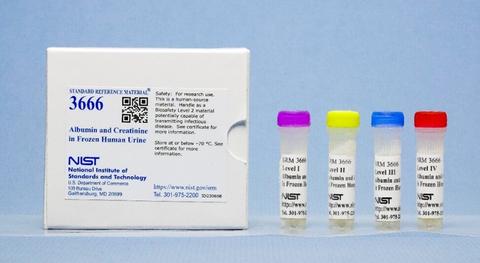Kidney Disease Diagnosis and Monitoring
Standard Reference Material® 3666 Albumin and Creatinine in Frozen Human Urine

SRM 3666 Albumin and Creatinine in Frozen Human Urine
Kidney disease is a major global public health issue, with chronic kidney disease (CKD) representing the 12th highest cause of death worldwide. It has been estimated that approximately 10 % of the global population has CKD. Kidney disease involves a loss of kidney function and is most commonly diagnosed using a urine test. Albumin and creatinine are biomarkers of kidney disease and are used for clinical decisions associated with disease diagnosis and management.
To support the global comparability and confidence of results used in clinical decisions for kidney disease, NIST has partnered with the National Institute of Diabetes and Digestive and Kidney Diseases (NIDDK) and the International Federation of Clinical Chemistry (IFCC) to develop a traceability framework for albumin in human urine. Standard reference material (SRM) 3666 is the first four-level human urine certified material for endogenous albumin at clinically relevant concentrations. SRM 3666 is intended for use in validating measurement procedures and qualifying control materials produced in-house and analyzed using measurement methods for the determination of albumin, creatinine, or the albumin‑to‑creatinine ratio (ACR) in human urine.
A unit of SRM 3666 consists of four vials, each containing approximately 1.0 mL of frozen pooled human urine. Each vial contains different amounts of endogenous albumin, creatinine, and ACR (Level I, Level II, Level III, and Level IV).
Learn more:
Beasley-Green A, Camara J, Heckert NA (2023) Certification of Standard Reference Material® 3666 Albumin and Creatinine in Frozen Human Urine. (National Institute of Standards and Technology, Gaithersburg, MD), NIST Special Publication (SP) 260-238. https://doi.org/10.6028/NIST.SP.260-238

